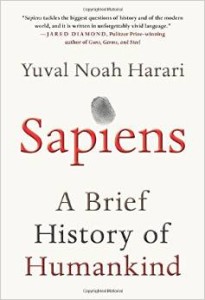How Did We Get Here, II

At last, I have found the BIG PICTURE I have been looking for since my history studies at Rice–a book that tells me how our species came to dominate the Earth, steppe by steppe, over the last 200,000 years. Yuval Noah Harari, who lectures at the Hebrew University of Jerusalem, connects the dots between history, anthropology, religion, politics and science in a provocative 400-page book that sheds fresh light on my personal struggle to reconcile facts with faith. Sapiens was originally published in Israel in 2011; the American edition came out just two weeks ago. David heard an interview with Harari on NPR and suggested it as the perfect follow-on to my Origins course post.
Harari discusses four major revolutions in human history: Cognitive, when language emerged 70,000 years ago; Agricultural, when plants and animals were domesticated 12,000 years ago; Scientific, when humankind admitted ignorance and began to acquire practical power 500 years ago; and Industrial, when, according to Harari, States and Markets began to replace family and community 200 years ago. At the same time humankind began a massive extinction of plants and animals.
This quote from Sapiens gives me perspective on reconciling my reading in the sciences with my religious faith.
Just as medieval culture did not manage to square chivalry with Christianity, so the modern world fails to square liberty with equality. But this is no defect. Such contradictions are an inseparable part of every human culture. In fact, they are culture’s engines, responsible for the creativity and dynamism of our species. Just as when two clashing musical notes played together force a piece of music forward, so discord in our thoughts, ideas and values compel us to think, re-evaluate and criticize. Consistency is the playground of dull minds.
Harari points out that the last seven decades since World War II have been the “most peaceful era in human history.” Only 1.5 percent of the 56 million deaths in the year 2000 were caused by war or violent crime. He is optimistic about ample energy resources on Earth (duh, the Sun), but despairs our tendency to lay waste to the Earth, to make other species extinct and to mistreat farm animals. Particularly interesting to me are his speculations on human progress (are we really better off than hunter/gatherers with their varied diet and outdoor lifestyle?) and human happiness. This time last year, I read Gretchen Rubin’s book, The Happiness Project, and rated my own happiness at a high level. Thankfully, it still is. Harari explains how humans generally reset whatever happiness levels they had after serious disruptions.
In December 2014 Harari gave this Ted Talk explaining how Homo Sapiens control the world.
See another interesting interview with Harari here. Sapiens contains a paleo diet of topics to chew on. When you read it, I invite you to post your comments below.
Leave a Reply